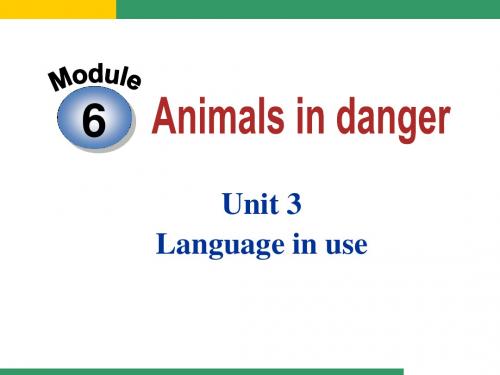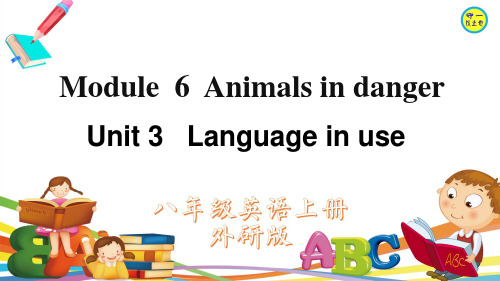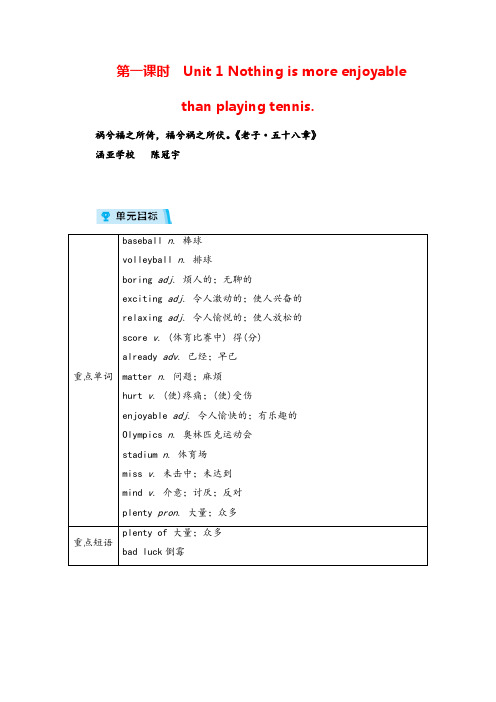外研版八上Module6 Unit3 教案
外研版八年级英语上Module_6_Unit_3

to tell 2. He sent an email __________ people what was happening. 3. In order_________ to save pandas, people will grow more bamboo in the mountains. to feed 4. The zoo asks us not __________the animals.
Daming: It’s about animals in danger, and c what the government is doing (3)_______ . Tony: Oh, I’d like to see it. I’m doing my e homework about that. What time (4) _____? Daming: At eight O’clock. Tony: So what time (5) _________? a Daming: At half past seven, outside the school gate. Tony: Ok. See you then. Daming: See you.
(2) feed (live) on sth. “吃”,“动物以…为食”,主 要用于动物。 Sheep feed on grass. 羊主要吃草。
3
Read and complete the sentences.
Pandas eat bamboo to live. to help pandas 1. Scientists do a lot of research ____________ produce more babies and help baby pandas live _______________________________________. 2. The government is setting up nature parks to protect pandas in the wild _____________________________. 3. The WWF chose the panda ____________ to be its symbol 4. The WWF is working hard to save all the animals ____________________.
外研版初中英语八年级上册全册教学设计教案

外研版初中英语八上全册教案及导学案初二英语(上)Module 1 Unit 1 教学设计教材分析:Unit 1通过听、读、说训练,初步学习给别人提建议的方法。
其中活动1要求将所给表示学习活动的词汇分类;活动2要求根据录音判断对话主题;活动3—5听读包含建议的对话并完成填表、答问等任务。
活动6学习英语中的连读法;活动7根据提示口头练习给别人提建议的方法。
教学目标:To get to know the key vocabulary.To understand the dialogue 3.To be able to talk about the problems in learning English.教学重点:Key points: translate, correct, grammar, pronunciation, spelling, try to do,Why don’t you…? How about…?教学方法Listening and speaking.教具准备Tape recorder教学流程Grade8 Module1 Unit2达标题:一.Complete the sentences with the next words.Check correct improve match number1.______your English by listening to the radio.2.______the pictures in the order you hear them.3.______the mistakes in these sentences.4._______the pictures with the paragraphs.5._______ your spelling and punctuation.二.完成单词1.You should practice more to i ___________ your English.2.Can you c_________ to 100 in English.3.Don’t f_________ to turn off the English when you leave the room .4.I can’t r__________ all the new words .5.Can you t__________ this word .I don’t understand it.6.R__________ the correct answer.Unit 3 Language in use 教学设计贾建芝教学目标To encourage students to write an English study plan for themselves this year.To say what they’re good at, what they aren’t good at and what they should do.教学重点Focus: Why don’t we …?How about…?You should do ….It is + adj. + to do ….设计思路Present a practical task for the students to learn language in use.Teaching stepsWarming-up教师活动1.Ask the Ss to retell the text in Unit 2. Choose one question to retell2.Ask the Ss “ How to learn English?” and let them to discuss in groups and presenttheir answers.(也可以My ways to learn English为题演讲)学生活动 1.Try to retell the text.2.Discuss in groups and show the answers in front of the class.(2 minutes to prepare ,then give a speech.)In-put教师活动Read and learn the useful sentences in Language in use.You should …Why don’t you….?It’s + adj. + to do sth.学生活动Read loudly and try to understand the meaning of every sentence ,then use them to make some sentences.Practice 1.Listening practice.Play the tape and finish off part 1 and 2.2.Show six pictures. Ask them to talk about them and say if Jack is a goodstudent.(work in pairs.)3.Ask the Ss to give advice to Jack.4.Ask them to work in pairs and read the problem and give advice.(work in groups,each student answer two problems.)5.Ask them to finish part 6-9Practice1. -What are you doing ? -I _____________( play ) football.2. Today is my sister's birthday. She is __________ (cut) her birthday ake now.3. Li Ming _______( have ) five lessons every day.4. He ___________( visit ) his grandfather in Nanning this weekend.5. Leny comes from India. He is ___________(India).6. I will take some _________(photo) in Lingshui Lake.7. On Sunday morning I will help my mother ___________(make) the lunch.8. Jenny will practise ___________(play) the piano this afternoon.9. Would you like __________ (have) a cup of tea?10. I hop you'll enjoy ____________(go) to your grandparents' farm.Out-putAsk students to present their thinking and their English study plan and finish off part 10-12.Make an English study plan for themselves for this year, then read it in front of the class. Summary The difficulties of this unit.Homework 1.Write the new words ten times.2.Write an English study plan.教学反思It’s hard to improve the students’ writing skill. Some students need help.达标题一、单项选择:( ) 1.-Where are you from?-I am from______.A. ChineseB. AmericanC. JapaneseD. America( ) 2.-What's your favourite_____?-It's Maths.A. teacherB. subjectC. foodD. drink( ) 3. I have English, Maths, Chinese and Physics _____ Monday orning.A. onB. inC. atD. to( ) 4.-Can I ask you _____ questions____ a survey ?-Sure.A. any, forB. some, forC.a, toD. an, of( ) 5. He is good at _______ football .A. playB.plaiingC.playingD.plays( ) 6. I like Physics,____Maths is my favourite !A.andB.soC.orD.but( ) 7. Will you do ________ for National Day holidays.A. something specialB. special somethingC. anything specialD. special anything( ) 8. He is looking forward to _______ the famous singer.A. seeB. seesC. seeingD. saw( ) 9.Don't forget _______the flowers when I leave.A.to waterB.waterC.wateringD.waters( ) 10.It will _____ me half an hour to go to school on foot.A.spendB.payC.costD.take( ) 11.I hope you 'll enjoy____here with us.A.liveB.livesC.livingD.to live( ) 12.-_____Tom come to your party this evening ?-I am not sure.A.WasB.AreC.IsD.Will( ) 13.Li Ming often helps me ____ my homework on the weekends.A.withB.onC.inD.about( ) 14.-What will you do in Hong Kong ?-I am not sure. _____ I'll see some famous sights.A.MayB.May beC.MightD.Maybe( ) 15. My brother is too _________ to go to school.A. smallB. youngC. bigD. old二、词形变换,用括号中单词的正确形式填空(20分)1. -What are you doing ? -I _____________( play ) football.2. Today is my sister's birthday. She is __________ (cut) her birthday ake now.3. Li Ming _______( have ) five lessons every day.4. He ___________( visit ) his grandfather in Nanning this weekend.5. Leny comes from India. He is ___________(India).6. I will take some _________(photo) in Lingshui Lake.7. On Sunday morning I will help my mother ___________(make) the lunch.8. Jenny will practise ___________(play) the piano this afternoon.9. Would you like __________ (have) a cup of tea?10. I hop you'll enjoy ____________(go) to your grandparents' farm.Module 2 ExperiencesUnit 1 Have you ever entered a competition?贾建芝题材内容:本模块的语法为现在完成时,内容主要涉及经历。
外研版八年级英语上册Module 6 Unit 3(含音频)

5. 作状语:可用作修饰动词或形容词的状语,一般 放在其修饰的动词或形容词之后。 eg:上周我去图书馆借了一些有关如何保护环境 的书。 Last week I went to the library to borrow some books on how to protect environment.
a) shall we meet b) to ask me c) to protect them
d) to see a film e) will it start
Tony: Hi, Tony speaking. Daming: Hi, Tony. It’s Daming. Do you want
(1) ___d___ this evening?
2 We can help animals live safely __in__th_e__w_i_ld__. 3 Let’s leave the animals in nature parks _i_n_p_e_a_c_e_. 4 We should try hard _in__o_r_d_e_r_t_o_ save animals.
1 I went to the nature park to… 2 They asked the children… 3 Let’s help them… 4 We want..
4 Complete the conversation with the expressions in the box.
more bamboo in the mountains. 4 The zoo asks us not ___to__f_ee_d___ the animals.
3 Complete the sentences. How many different sentences can you make?
外研版八年级上册Module 6教案及练习

外研版八年级上册Module 6Animals in danger Unit 1 It allows people to get closer to them【第一学时】【学习目标】1.掌握新单词以及表达。
2.提高听和说的能力。
3.了解面临灭绝的动物有哪些。
【学习过程】I. Listening.1.What is this week’s Animal World about?A pandasB snakesC lions2.Animals such as pandas, elephants and are in danger.1.Where did Ling and Betty go?A.Panda Reserve B.the zoo C.the museum2.What kind of animal did Betty see at last?A PandasB tigersC monkeys3.Do many animals have a safe place to live?A.Yes, they do. B No, they don’t.4.Is there enough clean water?A.Y es, there is. B.No, there isn’t.5.We can give ______ to help protect the animals.A. Water B. money C. forestⅡ. Reading: Read and answer the questions.1.Why did Betty like the panda in the Panda Reserve?A.B ecause it was interestingB.B ecause the pandas there are in dangerC.B ecause it allows people to get closer to them.2.It is sad to pandas and other animals3.Many animals are in danger because______.A.They have no safe place to live. B.There isn’t enough clean water.B.Both A and B.4.What will they do to protect animals next?Ⅲ.Use the correct form of the words and expressions to complete the passage.I went to the zoo yesterday. I saw many animals, and I saw the pandas. But I hope to see pandas in the Panda Reserve, because it ____People get closer to them. It is pity that many animals, such as panda, are . Because villages and farms are their lands and forests, and they don’t have a safe place to live. Besides, there isn’t clean water. I think we need to help animals live . So I plan to at school to save these animals. 【学习拓展】一、从方框中选择适当的选项,完成对话。
外研版英语八年级上册Module 3第一课时教案与反思

第一课时Unit 1 Nothing is more enjoyablethan playing tennis.祸兮福之所倚,福兮祸之所伏。
《老子·五十八章》涵亚学校陈冠宇重点单词baseball n. 棒球volleyball n. 排球boring adj. 烦人的;无聊的exciting adj. 令人激动的;使人兴奋的relaxing adj. 令人愉悦的;使人放松的score v. (体育比赛中) 得(分) already adv. 已经;早已matter n. 问题;麻烦hurt v. (使)疼痛;(使)受伤enjoyable adj. 令人愉快的;有乐趣的Olympics n. 奥林匹克运动会stadium n. 体育场miss v. 未击中;未达到mind v. 介意;讨厌;反对plenty pron. 大量;众多重点短语plenty of 大量;众多bad luck倒霉重点句子1.So this week's match is already more exciting. 所以这周的比赛已经精彩多了。
2.What's the matter with you, Tony?你怎么啦,托尼?3.Yes, watching is not dangerous and it's more relaxing too!是的,看比赛不危险,也更令人放松!4.Nothing is more enjoyable than playing tennis. 没有什么事比打网球更令人愉快的了。
5.Yes, but that's because it was cheaper than buying tickets for all the games. 是的,但那是因为看电视比买所有比赛的票要便宜得多。
教学难点1.让学生掌握多音节和部分双音节的形容词变比较级和副词变比较级的规则。
外研版八年级英语上册M3 Sports全单元教案

模块授课教案课题Module 3 Sports 模块序号 3教学目标1.知识目标:1> 掌握词汇:baseball, volleyball, boring,exciting, relaxing…2> 掌握句型:It’s more difficult topractice in winter. This year we’re passing more carefully. 以及一些口语表达句式。
3>掌握形容词副词的比较级的规则变化及不规则变化。
2.能力目标:1> 能听懂并谈论关于体育运动的英文表达。
2> 能熟练地运用形容词副词的比较级进行比较,谈论与差异对比有关的话题。
3> 能够读懂与体育运动有关的文章,并能就其内容展开讨论。
3.情感目标:1> 通过教学使学生知道体育运动的重要性,培养学生对体育锻炼的热爱。
2> 使学生了解体育竞技的精神和意义所在。
教材及学生分析在上一模块的教学中学生已经对形容词的比较级的基本规则有了初步的了解,但对于一些较长的单词及副词并没有涉及。
本模块延续了这一教学内容,将比较级的知识进行更系统和完整的学习。
消除学生心中存在的一些疑惑从而更加透彻的掌握这一知识点。
本模块的话题是体育运动,这也是与学生的日常生活息息相关的内容,因此,教师可以将学习和生活联系起来,从而加强理解和记忆。
重点与难点1.教学重点: 掌握第三模块的新单词和新句型。
形容词和副词的比较级。
2.教学难点:形容词和副词的比较级的特殊变化。
课时分配第一课时:Unit1 第二课时:Unit2第三课时:Unit3 第四课时:Module test 第五课时:Comment课时教学设计课题Unit 1 Nothing is moreexciting than playingtennis.主备课人授课时间2014年09 月课型Listening and speaking教学目标1.知识与能力:1> 掌握词汇:baseball, volleyball, boring,exciting, relaxing…2> 掌握句型:It’s more di fficult to practicein winter. This year we’re passing more carefully. 以及一些口语表达句式。
外研版英语八年级上册 Module 6 Unit 3 Language in use.
Module 6 Unit 3课堂检测题Class_________Name_________Number_________一、默写短语在山里_________________________你做了某事真的太好了_________________________难以相信___________________________ 在野外___________________________如此严峻___________________________ 在地球___________________________玩得开心___________________________ 制定计划___________________________做重要的研究___________________________ 以...为主食__________________________二、单项选择( )1. There are many rules in Mary’s home. For example, her parents wont’ allow her ______out late.A.t o stayB.stayingC.stayD.stayed( )2. They threw the rubbish into the river. But the teacher told us__________the river.A.p rotectB.polluteC.to protectD.to pollute( )3. ________more money, he works harder than before.A.G etsB.GetC.To getD.Got( )4. The boss made the workers_________for twelve hours a day.A.w orkedB.to workC.workingD.work( )5. If prices rise too high, the government has to do something________it.A.stopB.stoppedC.stoppingD.to stop三、根据汉语意思完成句子1.The peaceful music in the CD made the students______________________.唱片里宁静的音乐使学生感到放松。
外研版八年级上册英语精品教学课件 Module 6 Unit 3
1. 动词不定式做宾语补足语
不定式做宾语补足语是对宾语的补充说明。 1)带to的动词不定式作宾语补足语的动词主要有: 要求允许提议(ask, allow, advise),期望邀请鼓励 (expect, invite, encourage),教导告诉想要(teach, tell, want),等待希望愿意(wait for, wish, would like / love)。如: I’d invite her to have dinner at my house. We should allow the children to choose their own clothes.
3 Complete the sentences. How many different sentences can you make? 1. I went to the nature park to… 2. They asked the children… 3. Let’s help them… 4. We want…
Daming: At half past seven, outside the school gate.
Tony: OK. See you then.
Daming: See you.
Complete the passage with the correct form of the words in the box.
She came to this city to visit her daughter.
3. 不定式做原因状语和结果状语 1)原因状语,多见于“sb.+be+adj.+to do...”结构句中。 如:
I feel very lucky to have him. He ran out of money to buy old bikes. 2)结果状语,多见于“too...to”,“enough to...”结构 句中。如:
外研版英语八年级上册Module 6《Animals in danger》(Unit 3)教学设计1
外研版英语八年级上册Module 6《Animals in danger》(Unit 3)教学设计1一. 教材分析本课是外研版英语八年级上册Module 6《Animals in danger》(Unit 3),主要讲述了四种濒危动物:大熊猫、金丝猴、朱鹮和扬子鳄。
教材通过介绍这些动物的生活习性、保护现状,引导学生关注动物保护,提高环保意识。
本课包括听、说、读、写等多个方面的内容,旨在全面提高学生的英语能力。
二. 学情分析八年级的学生已经具备了一定的英语基础,能够进行简单的听、说、读、写。
但学生在动物保护方面的知识相对较弱,需要通过本课的学习,提高他们的环保意识。
同时,学生对于新知识的接受能力不同,部分学生可能需要更多的引导和鼓励。
三. 教学目标1.知识目标:学生能够掌握有关濒危动物的词汇和表达方式,如endangered, habitat, protection等。
2.能力目标:学生能够听懂、会说、会读、会写关于四种濒危动物的介绍,提高他们的英语综合运用能力。
3.情感目标:学生能够认识到动物保护的重要性,提高环保意识。
四. 教学重难点1.重点:学生能够掌握有关濒危动物的词汇和表达方式,能够用英语简单介绍四种濒危动物。
2.难点:学生能够正确使用一般现在时态描述动物的生活习性和保护现状。
五. 教学方法1.任务型教学法:通过设置各种任务,激发学生的学习兴趣,提高他们的参与度。
2.情境教学法:创设情境,让学生在真实的语境中学习英语,提高他们的语言运用能力。
3.合作学习法:鼓励学生相互合作,共同完成学习任务,培养他们的团队精神。
六. 教学准备1.准备有关濒危动物的图片、视频等教学素材。
2.设计各种任务,如填空、选择、问答等,以便在课堂上进行操练。
3.准备听力材料,让学生听懂四种濒危动物的介绍。
七. 教学过程1.导入(5分钟)利用图片、视频等素材,引导学生关注四种濒危动物,激发他们的学习兴趣。
2.呈现(10分钟)呈现教材中的听力材料,让学生听懂四种濒危动物的介绍。
外研版初中英语八年级上册教案全册
外研版初中英语八年级上册教案全册Module 1 How to learn EnglishUnit 1 Let’s try to speak English as much as possible.一、学习目标:A.单词和短语:pair, correct, spelling, word, practice, match, meaning, complete, sentence, dictionary, grammar, letter, look up, mistake, make a mistake, understand-understood, advice, should, possible, write down, notebook, forget-forgot, pronounce, aloud, radio, pronunciation, key, main, excellent, agree, agree with sb., vocabulary, ask for, improve, basic, time, advise, shy, conversation, quickly, natural, suggest, placeB.交际用语:1. Ready?2. That’s a good idea.3. What else?4. Thanks a lot!5. Excellent!6. We should always speak English in class.7. Let’s try to speak English as much as possible.8. Why not write down the mistakes in our notebooks?9. It’s a good idea to s pell and pronounce new words aloud.10. How about listening to the radio?11. It’s better not to translate.12. It’s a good idea to check new words every day.二. 教学目标1. Function: Giving suggestions (English study)2. Structure: Giving advice: 1) We/You sh ould…2) Let’s try to…3) Why not…?4) It’s a good idea to…5) How about…?6) Why don’t we/you…?7) It’s better not to…3. Skills: 1) Listening and understanding familiar topics (English study).2) Talking about problems in English study and giving advice, conductingconversations in several turns.3) Reading and finding specific information about English study.4) Drafting a letter asking for advice about English study, revising throughpair discussion..4. Around the world: English online5. Task: Writing your English study plan.三、重点及难点:Giving advice: 1) We/You should…2) Let’s try to…3) Why not…? 4) It’s a good idea to…5) How about…? 6) Why don’t we/you…? 7) It’s better not to…四、教学设计:Unit 1 Let’s try to speak English as much as possible.ⅠTeaching modelListening and speakingⅡTeaching methodPWP approachⅢTeaching aims1. To understand conversations involving advice on learning English.2. To get information about how to learn English from the conversation.3. To understand the way of giving advice.4. To practise giving advice on English learning.ⅣTeaching Objectives1. Key vocabulary: pair, correct, spelling, word, practice, match, meaning, complete,sentence, dictionary, grammar, letter, look up, mistake, make amistake, understand-understood, advice, should, possible, writedown, notebook, forget-forgot, pronounce, aloud, radio, key, main,excellent, agree, agree with sb., vocabulary2. Key structures: 1) We/You should…2) Let’s try to…3) Why not…? 4) It’s a good idea to…5) How about…? 6) Why don’t we/you…? 7) It’s better not to…ⅤTeaching aidsTape recorder, OHP , videoⅥTeaching StepsStep 1 Warming up1. Show some pictures of school things. Say how to learn English well.2. Read the words after the teacher.3. Introduce the new words.4. Learn the new words.Step 2 Read and check.1. Read the instructions in Activity 1and check(√) the ones you understand.1) Work in pairs. Ask and answer the questions.2) Correct the spelling.3) Listen and check the words you hear.4) Practise saying the words.5) Match the words with the meaning.6) Complete the sentences with the words in the box.3. Ask the students to check their answer with a partner.4. Call back the answer from the whole class and check the answer.Step 3 Listen and repeat.1. Ask the students to read the word and expressions in Activity2.dictionary grammar letter look up make a mistake meaning understand 2. Read through the questions.1) Which word did Daming not understand?2) What mistake did Lingling make?3) How does Daming usually check the spelling of a word?4) Why is it difficult for Daming to check the spelling of cinema?3. Play the recording and ask the students to listen to the recording carefully.4. Listen and answer the questions. Use the words and expressions from the box.5. Play the recording again, then they can check their answer with a partner.6. Call back the answer from the whole class and check the answer.Step 4 Listen and read.1. Show some pictures, and ask the students to talk about them.2. Ask the students to read the conversation silently.3. Play the recording and ask the students to listen and read the conversation.4. Read the conversation.5. Act it out.6. Learn “Everyday English”Ready?That’s a good idea.What else?Thanks a lot!Excellent!7. Tell the students how to learn English well.1) We should always speak English in class.2) Let’s try to speak English as much as possible.3) Why not write down the mistakes in our notebooks?4) Don’t forget to write down the correct answers next to the mistakes.5) It’s a good idea to spell and pronounce new words aloud every day.6) How about listening to the radio?7) How about reading English stories?8) W hy don’t we try to find some English pen friends?Step 5 Writing.1. Read the conversation again.2. Ask the students to write notes about learning English.Listening : listen to the radioSpeaking : ___________________________________________________ Reading : ____________________________________________________Writing: ____________________________________________________ Learning new words: ___________________________________________3. Ask the students to check with a partner.4. Check the answers:Keys:Listening : listen to the radioSpeaking : speak English as much as possibleReading : read an English storiesWriting: write to pen friends, write down our mistakes in our notebooks, write down the correct answers next to the mistakesLearning new words: spell and pronounce new words aloud every dayStep 6 Underline the correct words and expressions.1. Ask the students to read through the passage in Activity 4.Here’s my (1) advice / notebook about learning English. Speak English (2) always / as much as possible in class, and listen to English (3) in the newspaper / on the radio. I (4) agree / forget it’s a good idea to look up n ew worlds in the ( 5) notebook / dictionary. You can find the (6) correct / excellent pronunciation and learn the meaning2. Underline the correct words and expressions.3. Check with a partner.4. Call back the answers from the whole class.Keys: 1. advice 2. as much as possible 3. on the radio 4. agree 5. dictionary 6. correct 5. Read the passage together.Step 7 Listen and repeat.1. Play the recording once without stopping.2. Play the recording again and ask the whole class to repeat.1) We should always speak English in class.2) Let’s try to speak English as much as possible.3) Why not write down the mistakes in our notebooks?4) It’s a good idea to spell and pronounce new words aloud.5) How about listening to the radio?3. Ask the students to listen and mark the intonation.4. Now listen again and repeat.Step 8 Work in pairs.1. Talk about problems and give advice.Problems AdviceI can’t… How / What about …?I don’t know… Why not / don’t you …?2. Read through the example with the class.—I can’t speak English well. What should I do?—Why don’t you try to talk to our classmates in English?3. Work in pairs.Step 9 Important and difficult points1 Why not write down our mistakes in our notebooks?何不在笔记本上把我们的错误记下来?Why not …? 用来表示提出某种建议,而不是询问为什么不做某事的原因,例如:Why not take a walk in the park ?何不在公园里散散步?我们还可以用下面的表达方式来提建议:Why don’t we drive t o the country?我们何不开车去乡下?What / How about going to Europe for a holiday?去欧洲度假怎么样?Write down 或者put down 表示“记下,写下”。
- 1、下载文档前请自行甄别文档内容的完整性,平台不提供额外的编辑、内容补充、找答案等附加服务。
- 2、"仅部分预览"的文档,不可在线预览部分如存在完整性等问题,可反馈申请退款(可完整预览的文档不适用该条件!)。
- 3、如文档侵犯您的权益,请联系客服反馈,我们会尽快为您处理(人工客服工作时间:9:00-18:30)。
Module 6 Animals in danger
Unit 3 Language in use
I、Teaching type: Revision and application
II、Teaching aims:
1、Knowledge aim:
To master the grammar points.
2、Ability aim:
To summarize and consolidate the usage of infinitives as adjective complements and adverbial of purpose.
3、Emotional aim:
To realize how important to protect the animals in danger.
III、Teaching key points:
The usage of infinitives
IV、Teaching aids:
A tape recorder, multimedia
V、Teaching methods:
Interactive and situational approach
VI、Teaching procedures:
Step 1 Greetings &Revision
1、Greet students as usual.
2、Review the infinitive and the text.
3、Ask some students to summarize the usage of the infinitive first, then the
teacher summarize it with the class.
Step 2 Practice
Activity 1
1、Get students to finish the exercise about infinitive and check the answers.
2、Ask students to read the sentences together or in groups after checking.
Activity 2 Step 2 Practice&3
1、Complete the sentences with the correct form of the words in the box.
2、Let students read the sentence aloud.
Activity 4&5&6
1、Ask the student to practice the conversation in Activity 4 in pairs and then
change the roles.
2、Ask different pairs to act it out.
Step 3 Listening practice
1、Ask students to read through the poster to understand what to listen for.
2、Play the tape while they are listening.
3、Play it again for them to answer,
4、Then check the answers.
Step 4 Reading
1、Ask students to read through the email and the questions.
2、Nominate some students to share their ideas about the main ideas of the
email and tell them to check later.
3、Read again, then check whether their guesses about the main idea of the
email are correct and underline any information that helps them choose the
correct answers.
Step 4 Around the world
1、Ask students to read the passage by themselves.
2、Finish the following exercises.
(1) The largest animal in the world is _________.
(2) It lives in____ and eats ____ for food.
(3) The wild Bactrian camel lives in ______ and ________ .It is the ______ in
the world with two humps.
3、Read the passage again, then check for answers.
4、Solve the problems which the students meet in reading.
Step 5 Summary and homework
1、Give a short summary of the lesson.
2、Revise all the check points.
VII、Blackboard design:
Module 6 Animals in danger
Unit 3 Language in use
in danger, in the wild, in peace, in order to,
get more ideas, come to our meeting,
which kind of animals to help
VIII、Teaching reflection:。
